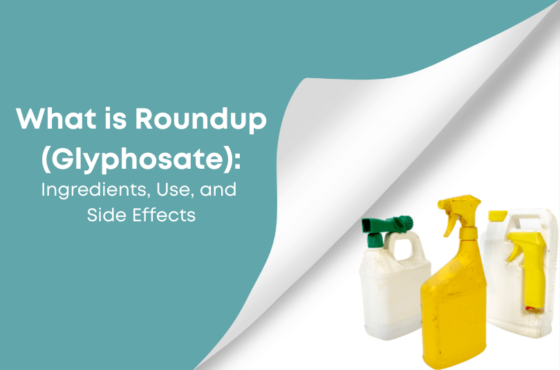Roundup is the top-selling weed killer in the United States. A large percentage of farmers across the country have depended on Roundup to keep weeds away from their farms. Ironically, however, Roundup contains an active ingredient that has long been under scrutiny over questions about its safety.
This weed-whacking main ingredient is called glyphosate. In 2015, the World Health Organization’s specialized cancer agency, the International Agency for Research on Cancer (IARC), classified glyphosate as a probable human carcinogen.
The cancer-causing potential of glyphosate even gained more attention when thousands of plaintiffs filed a Roundup lawsuit against the product’s manufacturer, Monsanto. Victims claim that they suffered from a type of cancer called non-Hodgkin’s lymphoma after being exposed to the toxic effects of Roundup.
Roundup concentrate can cause significant toxicity in adults and may cause side effects ranging from mild to severe.
Is Roundup toxic to humans?
Roundup toxicity to humans has been reported in several studies, including the plethora of health risks associated with it, such as an increased risk of cancer, endocrine disruption, developmental disabilities, cell damage, and leaky gut syndrome, to name a few.
The adverse impacts of Roundup to human and logical health have led 20 countries to either heavily restrict or ban the use of the herbicide in their farm lands.
Are children more sensitive to Roundup?
Yes, children are more sensitive to Roundup and the health effects of Roundup ingredients because their organ systems are still developing and maturing. As a result, their bodies metabolize toxins differently than an adult.
Additionally, because they are more curious, they have an increased likelihood of coming into contact with harmful chemicals stored in their homes, yards, schools, or parks.
How much Roundup is lethal?
>85 mL of ingested Roundup is lethal and may cause corrosive injuries to the gastrointestinal tract, accompanied with mouth and throat pain and swallowing difficulties. And even though Roundup manufacturer Monsanto contends that the chemical is safe when used as directed in the Roundup label, recent study findings suggest otherwise.
For instance, evidence exists that in Argentina, there is a high incidence of birth defects and cancers in residents living near areas where Roundup is being sprayed. Scientists and local activists also linked the herbicide to genetic malformations in amphibians.
Is Roundup toxic to animals?
The Roundup active ingredient glyphosate is generally considered harmful for animals when ingested or exposed to treated areas. Animals that could suffer from the lethal impacts of Roundup are listed below.
1. Roundup and Dogs
Dogs may be more vulnerable to Roundup exposure because they are closer to the ground and may lick or eat small quantities of recently sprayed herbicide on grass. Ingestion or external contact with grass that is still wet with Roundup may cause difficulty breathing, vomiting, diarrhea, hypersalivation, and heart rate problems in dogs.
2. Roundup and Horses
A property owner may use herbicides such as Roundup in a horse’s field and not be aware of its risks to the animal. Using herbicides may cause chemical changes in the plant that could make them more attractive to horses. Diarrhea and colic are the most commonly reported symptoms in horses following exposure.
3. Roundup and Livestock
For several decades now, farmers have been using glyphosate to kill weeds before planting corn feed for livestock. However, Roundup has been found to be toxic to the normal metabolism of livestock animals and may cause birth defects to their offsprings.
4. Roundup and Bees
Glyphosate-based products such as Roundup have been proven to be toxic to bees and are driving mortalities of up to 96% among the pollinators. Surprisingly, it is not the infamous active ingredient glyphosate that is causing deaths in bees, but the other ingredients in Roundup formulations that are not disclosed in its label.
5. Roundup and Birds
Roundup weed killing products are generally harmful to ecological health and therefore are toxic to birds. Glyphosate-based chemicals can also kill beneficial insects and fish that maintain ecological balance.
What are the symptoms of Roundup exposure?
Signs that are indicative of exposure to different Roundup formula may appear immediately, while others may develop at a later time. The symptoms of Roundup exposure are listed below.
- Headache: One of the most common symptoms that signal Roundup exposure is headache. Headache typically occurs after prolonged exposure to the herbicide at work or in laboratories. This is often accompanied by other symptoms, such as elevated body temperature, epigastric pain, and diarrhea, to name a few.
- Eye and skin irritation: Getting Roundup in the eyes and skin may cause irritations. In milder cases, the eyes may display redness and the skin may have rashes. However, in more severe cases, glyphosate can cause contact injuries, permanent blindness, or chemical burns.
- Dizziness: one of the most commonly reported symptoms by individuals who regularly handle herbicides such as glyphosate. Those who mix, load, and apply the chemical should have regular medical check-ups.
- Breathing difficulties: Breathing in Roundup can cause breathing difficulties. You may accidentally breathe in the substance upon application on your lawn, garden, or farm. Accidental exposure may also occur if you breathed in spray drifts near an area where Roundup was used.
- Abdominal pain: Accidental or intentional ingestion of glyphosate can cause gastrointestinal symptoms, such as abdominal pain. Swelling may also be present in the abdomen in such cases.
- Low blood pressure: Individuals who suffer from glyphosate exposure often experience low blood pressure or hypotension, which can quickly progress to shock and eventual death even with treatment.
- Convulsions: Long-term environmental exposure to Roundup can induce epileptic seizures in humans. Seizures are especially dangerous for children who get exposed to glyphosate because their brains are still in the process of developing.
Does glyphosate leave the body?
Yes, glyphosate leaves the body relatively quickly in urine and feces. As Roundup enters the body through the skin, mouth, or nose, it can become deposited in the airways or be absorbed by the lungs then moved into the bloodstream, where it can be carried throughout the body.
The body can break down and excrete the vast majority of glyphosate within a few days without being changed into a different chemical.
Can I test myself for glyphosate?
Yes, you can test yourself for glyphosate by ordering test kits from the Health Research Institute (HRI), which measure your glyphosate levels by testing urine. This is part of HRI’s publicly funded study called Glyphosate Check, where the non-profit laboratory accumulates study data geared at learning more about the extent of glyphosate exposure.
HRI also offers other ways people can check for glyphosate contamination, such as hair, soil, water, and pet and farm animals test kits that can also determine glyphosate levels in your body and anywhere else near you.
Ordering the test kits automatically allows you to participate in HRI’s research project. Various laboratories across the country also offer these tests at a slightly higher cost.
Why is Roundup getting banned?
Roundup is getting banned because of its association with cancer and other various health effects and its potential to harm ecological balance by causing the death of beneficial insects, such as bees.
In humans, Roundup use has been linked to several adverse health effects, from miscarriages to cancer. This prompted U.S. citizens to take up the fight against former Roundup manufacturer Monsanto to hold them accountable by filing lawsuits after they have developed non-Hodgkin’s lymphoma, a cancer of the immune system, following Roundup exposure.
Monsanto recently reached a Roundup settlement in around 100,000 lawsuits, where the agricultural giant paid approximately $11 billion. Despite this agreement, however, tens of thousands of active Roundup lawsuits still remain in state court.
Where is Roundup banned?
Roundup is banned in numerous countries all around the world, including Austria, Germany, Mexico, Vietnam, Saudi Arabia, the United Arab Emirates, Qatar, Bahrain, Oman, and Kuwait. The weed killer is also heavily restricted or soon to be banned in other countries such as France, The Netherlands, Spain, Sri Lanka, and Thailand, among others.
Glyphosate (Roundup) in Europe
Among the 27 nations that comprise the European Union (EU), Austria and Luxembourg are the only two countries to have totally banned the use of glyphosate. Austria was the first EU member country that banned all uses of glyphosate, followed by Luxembourg in 2021.
The report from the U.S. nonprofit organization Environmental Working Group about the majority of samples containing unsafe levels of glyphosate residue sparked public outcry for a glyphosate ban in EU countries.
This has caused several other member countries to rethink the use of the substance. Roundup is heavily restricted in European Union nations, such as France, Denmark, Belgium, The Netherlands, Portugal, Germany, Spain, Greece, Italy, and Malta.
Glyphosate is currently only approved for use in the EU until December 15, 2022. However, the union has postponed its decision on the renewal of glyphosate until the middle of 2023, which means that it could lead them to issue a temporary extension for the use of the active ingredient until that period.
Glyphosate (Roundup) in the USA
Countless states in the U.S. have taken steps to restrict or ban glyphosate, including Tucson in Arizona, Long Beach, Los Angeles Country, Napa, Sonoma, and 20 other cities in California, Boulder and Durango in Colorado, as well as Miami Beach, Fort Myers, Key West, and eight other cities in Florida, to name a few.
All in all, more than 70 cities across different U.S. states have discontinued or restricted Roundup use. But despite a handful of cities and states leading the charge by restricting, banning, or informing farmers why Roundup is bad, the chemical is still yet to be banned in the entirety of the United States as of writing.
Glyphosate (Roundup) in Canada
Although the Canadian government has not instituted a nationwide ban on glyphosate, it is one of the many countries that are considering the dangers of the active ingredient. In fact, earlier this year, Laval and Montreal have banned the domestic use of glyphosate, while Quebec has banned its use in forest management and is considering a total ban on the harmful chemical.
Reports indicate that eight of 10 provinces in Canada have enacted restrictions on glyphosate use. Roundup lawsuits are also being filed in the country against Bayer, claiming that the chemical giant failed to warn the public of the dangers of glyphosate.
Glyphosate (Roundup) in the UK
Since the WHO’s IARC classified glyphosate as “probable human carcinogen” in 2015, 70 to 80 councils or local governments in the United Kingdom have banned the use of glyphosate and turned to chemical-free methods.
From Highland council, to Bath & North East Somerset council, and Hammersmith & Fulham council in London, glyphosate bans or pledges to phase out the chemical have been made in several parts of the UK.
But since the country has fully departed the EU, it will take responsibility for its own regulatory decisions on Roundup use, and the weed killer is approved for five more years in the UK, or until at least December 15, 2025.





